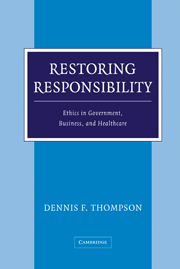Book contents
- Frontmatter
- Contents
- Acknowledgments
- Restoring Responsibility
- Introduction: The Need for Institutional Responsibility
- PART I DEMANDS OF INSTITUTIONAL POLITICS
- PART II VARIETIES OF INSTITUTIONAL FAILURE
- 6 Democratic Secrecy
- 7 Mediated Corruption
- 8 Election Time
- 9 Hypocrisy and Democracy
- 10 Private Life and Public Office
- Part III EXTENSIONS OF INSTITUTIONAL RESPONSIBILITY
- Credits
- Index
6 - Democratic Secrecy
Published online by Cambridge University Press: 29 January 2010
- Frontmatter
- Contents
- Acknowledgments
- Restoring Responsibility
- Introduction: The Need for Institutional Responsibility
- PART I DEMANDS OF INSTITUTIONAL POLITICS
- PART II VARIETIES OF INSTITUTIONAL FAILURE
- 6 Democratic Secrecy
- 7 Mediated Corruption
- 8 Election Time
- 9 Hypocrisy and Democracy
- 10 Private Life and Public Office
- Part III EXTENSIONS OF INSTITUTIONAL RESPONSIBILITY
- Credits
- Index
Summary
Sunshine laws, the Freedom of Information Act, investigative journalism, and a robust First Amendment ensure that U.S. citizens have access to more information about public officials and public agencies than ever before in history. Yet even in what may be the most open national government in the world, secrecy persists. According to the Information Security Oversight Office, which keeps watch over the U.S. government's secrets, more than three and a half million new secrets are created each year. That works out to almost ten thousand new secrets a day. No doubt many more secrets were not even recorded. Until recently, even the rules and criteria for classifying and declassifying secret information were themselves secret. There are now two million officials in government and another one million in private industry with the authority to classify documents. Many of these are what are called derivative classifiers, who without signing their own names can declare their own document classified just because it quotes from another, originally classified, document.
Government secrecy certainly has not been ignored. Many scholars and reformers have examined it critically, and government bodies have investigated the problem. A bipartisan national Commission on Government Secrecy headed by Senator Daniel Patrick Moynihan concluded that a massive “culture of secrecy” has spread with little oversight throughout the government during the past eighty years, and has now seriously eroded our democratic process. Nevertheless, most of the literature on government secrecy neglects the fundamental democratic values underlying the problem and focuses instead on the laws and policies that regulate secrecy, patterns of abuses by individual officials, or particular practices such as executive privilege and national security.
- Type
- Chapter
- Information
- Restoring ResponsibilityEthics in Government, Business, and Healthcare, pp. 129 - 142Publisher: Cambridge University PressPrint publication year: 2004



